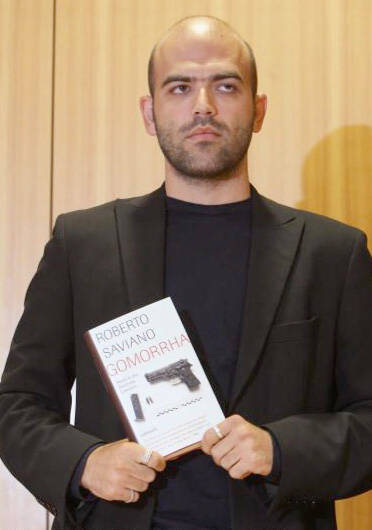Rushdie on Saviano: Camorra’s fatwa worse than Khomeini’s
Roberto Saviano, the 28 year-old author of Gomorra, the now world-famous exposé of
Rushdie himself said so this week from Paris in response to reports that camorristi from Casal di Principe, on the outskirts of
According to newspaper reports, Saviano was to be killed by explosives planted on the highway between
Rushdie said that Saviano “is in terrible danger.” “Without doubt he will have to leave
That’s really saying something, since Rushdie, with his novel The Satanic Verses, had incurred the wrath of Islamist fanatics not only in
Saviano is guarded by seven heavily-armed carabinieri who live with him and accompany him everywhere. He remains alive only because of this 24/7 protection.
The Italian government gave him a bodyguard in 2006, after the first credible threats were made against his life. That year he made what was to be his last public appearance in the
This month, after the reports that the Casalesi had marked him for death, Saviano told La Repubblica that he was going to leave
“I want a life. I want a home,” he said. “I want to fall in love. I want to drink a beer in public, go to a bookstore and choose a book after checking out the back cover. I want to go for a walk, take the sun, walk in the rain and see my mother without fear and without frightening her. I want to have my friends around and be able to laugh and not to have to talk about me, always about me, as if I had a terminal disease and they had to put up with a boring but unavoidable visit. Fuck, I'm only 28 years old!”
The British newspaper The Guardian, in an October 15 editorial titled “In Praise of Roberto Saviano,” noted why Saviano’s fears are justified. “His hatred of the Camorra…is personal,” the editorial observed. “He grew up in Casal di Principe…and lived alongside the Casalesi clan whose savagery he captures. He hates them and does not mind them knowing it.” But Saviano’s loathing of the Casalesi would matter little if Gomorra, both the best-selling book and the acclaimed Matteo Garrone film made from it, hadn’t “trained an unwelcome spotlight on his home town.”
“Many authors have taken the mafia on and lived to tell the tale,” the editorial observed. “But few have rubbed them up the wrong way quite as badly as Roberto Saviano.”
There is no doubt that Saviano is a marked man. But Italian media reports this past week confused rather than clarified the threats he faces. Carmine Schiavone, the cousin of the imprisoned Casalesi boss “Sandokan” and the reported source of the information about the plan to kill Saviano by Christmas, denied having tipped off the authorities about such a plot. Schiavone is an ex-mobster who became a “pentito” (government informer) in 1993.
Saviano is doubtful about Schiavone’s denial. “It’s difficult for a ‘pentito’ to admit to still having contacts with the clans,” he said. With Italian authorities continuing to investigate the highway murder scheme, his skepticism seems entirely justified.
Then, on October 15, the television show Matrix reported that Sandokan himself sent a fax to one of his attorneys that, though ambiguous, did seem to threaten Saviano. Sarcastically referring to Saviano as “that great novelist,” the imprisoned camorrista said that the author “must stop spreading false and calumnious allegations against me.”
But Neapolitan prosecutors subsequently said that Sandokan did not send such a fax. The boss, however, apparently did make threats against the author in one of the letters he recently sent to his attorneys.
Saviano, according to press reports, now is unsure whether to leave
But Saviano is paying an exorbitantly high price for his prominence. And he suffers not only because he cannot live a normal life.
“The truth, the single obscene truth, that in these times is tragically evident, is that Roberto Saviano is a man alone,” wrote Repubblica columnist Giuseppe D' Avanzo.
Besides having provoked the murderous rage of the camorristi, he endures the rancor of the fearful and passive in Italy, as well as the envy of those who resent his success. Saviano, in an anguished interview with the journalist, expressed incredulity over accusations that he had only written Gomorra to become rich and successful.
“Saviano’s destiny,” D’Avanzo observed, “…is more than ever a matter of Italian democracy. His unarmed life, or rather his life armed only with words, has fallen into a gray area where the traditional difference between war and peace seems not to exist, if the mafia can declare war on the State and the State for too long hasn’t known how to end that violence against people and property nor how to protect essential rights -- beginning with the most fundamental of democratic rights: the right to free speech. If Saviano loses, all of us will lose.”
Visit Roberto Saviano at MySpace and leave him a message of support and solidarity:


































i-Italy
Facebook
Google+
This work may not be reproduced, in whole or in part, without prior written permission.
Questo lavoro non può essere riprodotto, in tutto o in parte, senza permesso scritto.